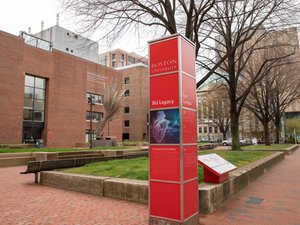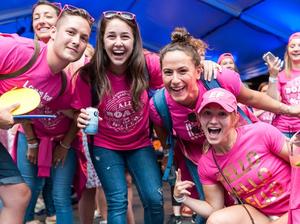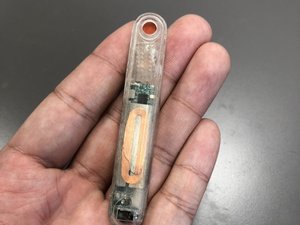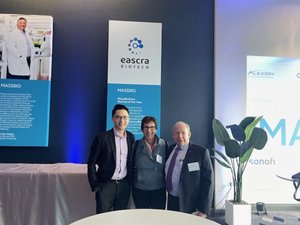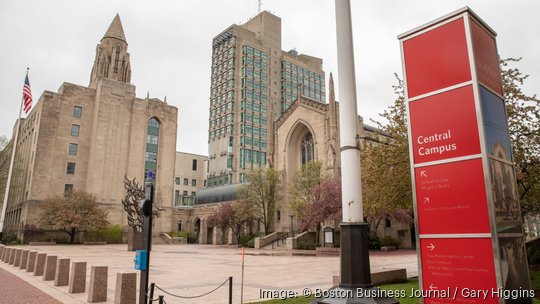
Boston University just turned a new leaf and rebranded its Innovation Lab, formerly the BUild lab, to the IDG Capital Student Innovation Center. The name may have changed, but the innovation at BU hasn’t, and the Ignition Awards are as much proof of that as anything.
The awards started in 2007 to get more of BU’s researchers to think like entrepreneurs. In the 17 years since their start, the Ignition Awards have gone on to fund companies like Sol Clarity, a water-free system for cleaning solar panels, and Atorvia, a company developing a therapy to reverse organ failure.
This year’s six Ignition Awards winners will receive either $25,000 or $75,000 and coaching and support to help them bring their products to market. The review committee for the Ignition Awards, composed of outside industry experts and BU academics, selects a group of finalists and makes funding recommendations.
The Ignition Awards recipients come from across BU disciplines, including dental treatment, cloud computing, and cancer therapies. Researchers use the funding and support to move their ideas towards new milestones, such as generating compelling data, showing proof-of-concept, or creating prototypes.
Some researchers are returning for their second Ignition Award, to continue their research from last year, like Yuwei Fan, a BU Goldman School of Dental Medicine research associate and professor of vital science and biomaterials. With the support from the last Ignition Award, Fan and his team demonstrated their ability to grow enamel in a lab environment and are planning to use the second Ignition Award to grow enamel in the “hostile environment” of the mouth. For other researchers, like DJ Wallman, the Ignition Award and the money and aid will help them carve out time for the technical efforts involved in developing particular cell lines that they can Gene edit using CRISPR technology.
Wallman is part of a team of BU pulmonologists trying to tackle the problem of primary ciliary dyskinesia, a lung disease with many different genetic variants that affects 1 in 7,500 to 1 in 11,000 people worldwide. PCD can cause chronic lung diseases, including chronic cough, respiratory infections, and eventually lung failure.
“Our hope overall is to provide cell-based gene therapy whenever that may be. These are all big stepping stones, and we're proud of them, but that's what's pushing us day in and day out,” said Wallman.
Meet the winners of this year’s Ignition Awards. Boston University has provided the following descriptions:
Strengthening teeth against sensitivity
If you’ve ever felt a shock of pain upon biting into your ice cream or sipping your coffee, you know that tooth sensitivity can spoil your favorite treats. But it’s more than just a nuisance, says Yuwei Fan, a BU Goldman School of Dental Medicine research associate professor of restorative sciences and biomaterials.
Sensitivity can be the first sign that a tooth’s protective enamel is wearing away, leaving the tooth vulnerable to decay and infection. Today, dentists can prescribe special toothpaste formulated with numbing agents that dial down nerve pain, but these products mask the symptoms rather than fix the real problem: they can’t bring back the lost enamel.
Made up of tiny mineral crystals, enamel is the hardest substance in the human body. It forms once, on emerging teeth, and it cannot restore or repair itself naturally if it breaks down with wear or disease. Now, Fan is developing a product that can actually grow a new, synthetic layer of enamel on damaged teeth that has the structure and characteristics of natural enamel.
With support from a previous Ignition Award, Fan and his team showed that they could grow tooth enamel crystals, under lab conditions, to create a fresh, synthetic enamel layer on real teeth. The next challenge is recreating this substance not just in the lab, but also in what Fan describes as the “hostile environment” of the mouth.
With a second Ignition Award, his team will gain insights from experts in manufacturing and commercializing dental technology on how to formulate and market the synthetic enamel formula as a treatment for tooth sensitivity. Fan will also continue to explore the many other potential uses for this platform technology.
Processing encrypted data in the cloud
Today, the most private details of our lives — from bank account numbers to medical records — are all in the cloud. Encryption protects that intimate data while it’s stored and while it’s in transit, but generally, the data has to be unencrypted before it can be processed. For example, imagine asking a cloud-based AI like ChatGPT a sensitive question about your health or finances. Your query is at its most vulnerable while it is being processed — in fact, about 64% of attacks happen while data is being processed, representing a loss of about $6 billion a year.
Computer scientists have long known that it’s possible to process data while it’s still encrypted, but the technology for doing so is gruelingly slow: it takes 10,000 times longer than standard processing. Fortunately, Rashmi Agrawal (ENG’17,’23), a BU College of Engineering research scientist, discovered a way to process encrypted data some 1,000 times faster. She uses a type of computer chip called a field-programmable gate array, which straddles traditional boundaries between hardware and software by allowing engineers to “program” the circuitry of the chip on the fly.
With Ajay Joshi, an ENG professor of electrical and computer engineering, she formed a company, CipherSonic Labs, to commercialize the technology. So far, they have shown that it works on an academic cloud environment called Mass Open Cloud. Their Ignition Award will allow them to expand the technology to commercial cloud computing platforms like Amazon Web Services.
Monitoring kidney dialysis in real time
It’s true what you’ve heard: the human body is mostly water. And we have the kidneys to thank for keeping our bodies’ water levels just right. But kidney disease disrupts this natural equilibrium. For roughly half a million Americans with the disease, dialysis can manually restore this fluid balance while removing toxins from the body via the blood.
“Dialysis is a huge lifeline. It’s vital for these patients,” says Darren Roblyer, an ENG associate professor of biomedical engineering and of electrical and computer engineering. “But there’s a problem: it’s not totally clear how much fluid to remove from each patient.” Remove too much water, and the patient can have painful muscle cramps and perilously low blood pressure. Remove too little, and the excess fluid can overload the heart, ultimately leading to heart failure. Today, patients have to rely on trial and error to get the balance right; in roughly two-thirds of cases, dialysis removes too much or not enough fluid.
Now, Roblyer’s lab is developing a device called DialySight that can track a patient’s fluid levels in real time during dialysis. Designed as an anklet, DialySight shines infrared light at a patient’s leg, then measures the reflected light to calculate how much water the tissue contains. In the future, the results could be used to fine-tune the rate and duration of dialysis to make sure that the procedure removes exactly the right amount of fluid.
With support from an Ignition Award, Roblyer has partnered with BU kidney expert Vipul Chitalia, a BU Chobanian & Avedisian School of Medicine professor of medicine, to use the device to take readings from 50 current dialysis patients. The goal: to zero in on key measurements so that he can optimize the DialySight design and make it practical and affordable—and help as many patients as possible.
Jump-starting a cure for lung disease
Before a new medicine reaches patients — before it passes FDA review, before it goes through clinical trials — drug developers have to show that it works on living cells in the lab. When the right cells aren’t available, the drug development process may never even get started.
A team of BU pulmonologists is hoping to jump-start drug development for the inherited lung condition primary ciliary dyskinesia, or PCD, by making certain lung cells, called ciliated cells, available to researchers and drugmakers. Patients with PCD have a problem with the cilia in their airways: the tiny brush-like cell structures that are supposed to help protect and clean the respiratory tract don’t work properly. Patients suffer from breathing problems and frequent infections. Sometimes, PCD is so bad that a patient requires a lung transplant.
“Currently, there is no targetable treatment for PCD,” says team lead Daniel Wallman of the BU Center for Regenerative Medicine. He’s working with Finn Hawkins, a BU associate professor of medicine, and Andrew Berical, a BU assistant professor of pulmonary, allergy, sleep, and critical care medicine, on the lab-made ciliated cells. “Our hope is to eventually cure PCD by being able to target and replace these cells in the airway with healthy cells.”
Using CRISPR/Cas9 gene editing technology, Wallman, Hawkins, and Berical create lung cells that are genetically customized to a patient’s unique mutation. (So far, dozens of different genes have been linked with PCD.) Through their start-up company, CilioMAP, they can offer these tailor-made cells to researchers and drug developers who will use them to link specific mutations with faulty cilia and to test out new therapies in the lab. The Ignition Award will support CilioMAP as the team works to produce dozens of different genetic variants at the volume and speed drug researchers demand.
Helping immune cells to fight pancreatic cancer
It’s one of the biggest questions in cancer research: How can we use the immune system to stop cancer cells from growing and spreading? Drugs called checkpoint inhibitors can help the body fight cancer by blocking proteins that cancer cells use to hide from the immune system. Checkpoint therapies are effective in treating more than a dozen different types of cancer—but not pancreatic cancer. Since pancreatic cancer has one of the lowest survival rates among all cancers, even when surgically removed, figuring out how to make it responsive to checkpoint inhibitors has the potential to significantly help patients.
Victoria Herrera and Nelson Ruiz-Opazo, both professors of medicine at BU’s medical school, are developing an antibody drug that may lead to more positive outcomes. They hope it will work hand in hand with immune checkpoint inhibitors to keep cancer cells from escaping the immune system. The antibody targets a gene called DEspR, which is not present in normal adult pancreatic cells, but is present on tumor cells and seen in increased levels on cancer stem cells. The gene is also expressed on certain immune cells that, paradoxically, help cancer evade the immune system. By simultaneously shutting off these “culprit” cells that express DEspR, while leaving normal cells with no DEspR intact, their goal is to help the immune system snare cancer cells without the debilitating side effects of chemotherapy drugs.
With support from their Ignition Award, Herrera and Ruiz-Opazo, working with Matthew Kulke, BU’s Zoltan Kohn Professor of Medicine and chief of hematology/oncology at Boston Medical Center, the University’s primary teaching hospital, will test the antibody, both alone and in concert with existing immune checkpoint inhibitor drugs. “We believe that if we can figure out how to make pancreatic cancer responsive to immune checkpoint inhibitors, in combination or by itself, we can really help patients with pancreatic cancer—and potentially help patients with other cancer types, as well,” says Herrera.
New hope for liver cancer
Patients diagnosed with the most common type of liver cancer, hepatocellular carcinoma, face a grim prognosis. Most are diagnosed too late or are too sick to qualify for surgery or a transplant. The average patient lives for only 11 months after being diagnosed.
Now, a team of BU biomedical engineers is developing a new way to attack proteins linked with many hepatocellular carcinomas. Their weapon: one of the body’s own proteins, retargeted to break down cancer proteins.
With support from their Ignition Award, Mark Grinstaff, a BU William Fairfield Warren Distinguished Professor, and PhD students Brett Tingley and Kirk Pierce aim to show they can program proteins to home in on cancer-causing proteins so that the body can destroy them. They think this could shrink tumors enough that they can be removed surgically. The approach could also work for other cancer types, including other liver cancers and colorectal cancer.
There are thousands of proteins in the human body that have been linked with diseases. The vast majority of these proteins are undruggable; that is, there are no drugs that target them — yet. Grinstaff and his team hope that their platform could one day be adapted to take on any disease-causing protein.
